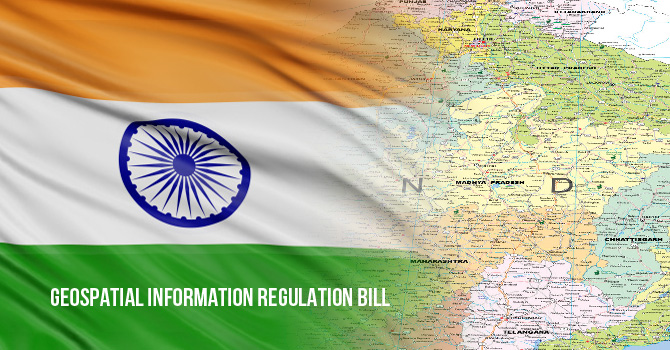On 5 May 2016, the Indian Government released the draft of the ‘Geospatial Information Regulation Bill, 2016’ for consultation and feedback from stakeholders.
The draft Bill has already generated much debate and apprehension amongst stakeholders who fear that inadvertent misuse or misrepresentation of map of India might lead them to jail along with a hefty fine. They fear that this could impede the spread of digital services in India that happens to be the stated objective of the present government.
Stringent punishment on the cards
The draft Bill states that any person or organisation that disseminates, displays or publishes any information collected through geospatial services that affects the integrity, security or sovereignty of the country, shall be liable to fines up to Rs. 100 crore and jail sentence of up to seven years.
What this effectively means is that any individual or organisation will now have to take permission from authorities to collect, publish or use any data or image, of any part of the country or location, gathered by means of satellite, aircraft, UAVs or balloons.
So, why is the government now taking a tough stand on this?
For any government, maintaining its territorial integrity is not just limited to physically guarding its borders but also maintaining its sanctity in the digital world.
With the internet increasingly blurring the existence of borders by offering border-neutral services to users across the globe, areas where there is territorial dispute or ambiguity, often raises local tensions amongst stakeholders.
India, has been and is, very assertive on what it believes is its territory and any data or image published that is contrary to its official position, has evoked strong response from the government and public, at large. But these have most been in the form of protests and appeals to those responsible for such violations.
Recent Cases of Misrepresentation
In recent years, there have been several cases on social media and the web at large, where parts of J&K, which India claims as its own, have been shown as part of Pakistan. Same is true for China, where certain parts of J&K and other areas in the northeastern side were wrongly published as part of China. These have generated strong reactions from the government and political parties.
Moreover, geospatial information easily available from services like Google Earth, Google Maps etc, has been reportedly used by terror groups against India. In the run up to the Mumbai terror attacks, Lashkar jihadis were reportedly shown images of vital locations in Mumbai.
To counter this and similar threats emanating from misuse of geospatial information and data, the Indian government has now decided to introduce the ‘Geospatial Information Regulation Bill, 2016’, which is meant to act as a strong deterrent against misuse of information or data against the country.
Does the Bill go against the spirit of ‘Digital India’?
Several stakeholders, technology analysts and enthusiasts have voiced their concerns over the proposed Bill which they believe is draconian and open to misuse and selective interpretation by elements within the government. Some have even gone as far as claiming that this is License Raj 2.0.
So, is there any merit to the opposition to the bill? In some ways, yes. There can be no debate that the country’s territorial integrity needs to be maintained, physically and in the digital world, and therefore, a stringent law against violators seems imperative.
Concern for Service Providers
The question is not about the law being violated by vested interests working against India, but service providers offering a host of digital information and services that depend upon geospatial information and data being provided by larger entities such as Google, Apple or even our very own ISRO. It is these service providers, many of whom are financially vulnerable, are apprehensive of the consequent impact of the Bill on their services.
The proposed law applies not just to primary data providers such as Google and Apple, but to down-the-line service providers like Cab aggregators such as Uber and Ola, restaurant aggregators and last-mile delivery services like Swiggy, or even real estate information service providers like MagicBricks, 99 Acres, etc, all of whom draw upon geospatial data and images to offer efficient services to their end users.
Now, any potential misrepresentation or wrong data accessed or offered by any of the above service providers could potentially land them in jail and/or have significant fines imposed on them.
Besides this, accessing of such services will become expensive, thus impacting end user cost and resulting in slower spread of digital services in India.
Monitoring the digital space will also make government officials very powerful and in a position to demand bribes from unaware or ignorant violators. If implemented in its present form, the proposed Bill could have severe consequences of these service providers.
Government Agencies Out of the Ambit of the Bill
Here, it may be clarified that the proposed Bill does not cover Indian government agencies such as ISRO, which is also another reason for protests emanating from various stakeholders.
The success of ‘Digital India’ lies in more service operators coming out with wider range of services and greater number of users accessing these services. If the proposed Bill acts as a deterrent to the spread of similar services, then it will end up as a case of the government meaning well but ending up shooting itself in the foot.
Proposed Regulatory Body
In order to regulate the digital world and ensure that there is no mala fide data or images contrary to India’s interests out there, the government is proposing to set up a regulatory body that will comprise of digitally aware senior bureaucrats along with subject matter experts who will oversee the digital space for violations. Hopefully, this body will successfully fulfill its responsibility while ensuring a level-playing ground for all.
It’s still a draft Bill…
That is true. The government has circulated the draft bill amongst stakeholders to set up a healthy debate and feedback process to address possible concerns and fears, and it is hoped that the government will be able to mitigate all stakeholder concerns before putting it up for final passage in Parliament.
Read More…
Nabha Jailbreak: Khalistani Terrorist Mintoo Arrested by Delhi Police






